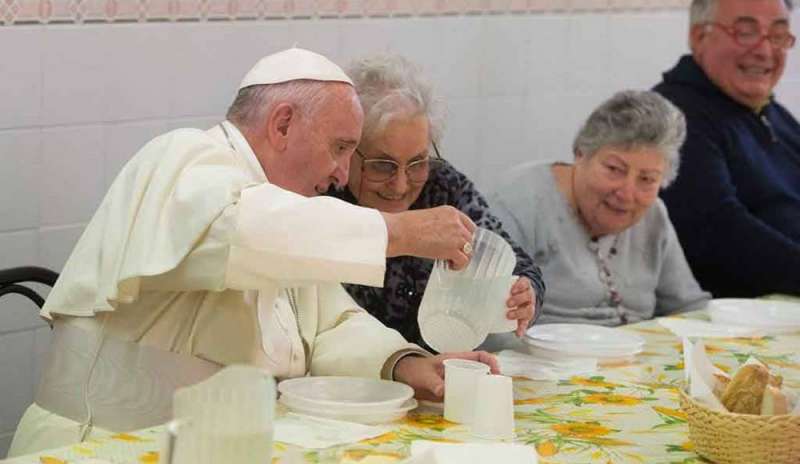Do not look away from the poor, says pope
The pontiff's message for the World Day of the Poor (19 November) was released today, centred on the new faces of poverty: the children victims of war, the “ethical confusion present in the world of labour,” the speculations that “compromise the dignity of every person,” and the “illusions created by a culture that leads young people to think that they are ‘losers’.” Instead, the pontiff calls for a place around the table for the marginalised.
Vatican City (AsiaNews) – Pope Francis’s message for the World Day of the Poor was released today, Memorial of Saint Anthony of Padua, Patron of the Poor.
This year, the annual event, which is celebrated every year on the Sunday before the feast of Jesus Christ, King of the Universe, will be held on Sunday, 19 November, marking the end of the Jubilee of Mercy.
In his message, the pontiff, who is still at the Gemelli Hospital convalescing from surgery he underwent on 7 June, urges the faithful not to look away from the poor.
For him “Our daily efforts to welcome the poor are still not enough. A great river of poverty is traversing our cities and swelling to the point of overflowing; it seems to overwhelm us, so great are the needs of our brothers and sisters who plead for our help, support and solidarity.”
To this end, we must, according to the pope, be guided by the biblical account of the Book of Tobit, especially Tobit’s invitation to his son, Tobiah, almost as a spiritual testament: “Do not turn your face away from anyone who is poor” (Tob 4:7).
These are the words from a man who, sitting at the table, invited Tobiah to find some poor soul among the deportees of Nineveh with whom he could share a meal.
“How meaningful it would be if, on the Day of the Poor, this concern of Tobit were also our own! If we were to invite someone to share our Sunday dinner, after sharing in the Eucharistic table”.
Instead, Tobiah finds a poor man killed and left in the market place and Tobit goes out to bury him, and in doing so he loses his sight.
“An irony of fate: no good deed goes unpunished! That is what we are tempted to think, but faith teaches us to go more deeply. The blindness of Tobit was to become his strength, enabling him to recognize even more clearly the many forms of poverty all around him.”
“Tobit, in his time of trial, discovers his own poverty, which enables him to recognize others who are poor. He is faithful to God’s law and keeps the commandments, but for him this is not enough. He can show practical concern for the poor because he has personally known what it is to be poor.”
This attitude is particularly timely today. “We are living in times that are not particularly sensitive to the needs of the poor. The pressure to adopt an affluent lifestyle increases, while the voices of those dwelling in poverty tend to go unheard.”
“The poor become a film clip that can affect us for a moment, yet when we encounter them in flesh and blood on our streets, we are annoyed and look the other way.”
But for the pontiff, “The parable of the Good Samaritan is not simply a story from the past; it continues to challenge each of us in the here and now of our daily lives. It is easy to delegate charity to others, yet the calling of every Christian is to become personally involved.”
This ought to be done, according to the pope, with people caught up in war, “especially children deprived of the serene present and a dignified future. We should never grow accustomed to such situations.”
But there is more. No one should “ignore those forms of speculation in various sectors, which have led to dramatic price increases that further impoverish many families. Earnings are quickly spent, forcing sacrifices that compromise the dignity of every person.
“If a family has to choose between food for nourishment and medical care, then we need to pay attention to the voices of those who uphold the right to both goods in the name of the dignity of the human person.”
Speaking about “the ethical confusion present in the world of labour,” Francis bemoans the “inadequate pay for work done; the scourge of job insecurity; the excessive number of accident-related deaths, often the result of a mentality that chooses quick profit over a secure workplace…”
Likewise, he laments the angst and the “illusions created by a culture that leads young people to think that they are ‘losers’, ‘good for nothing’.” Instead, “Let us help them react to these malign influences and find ways to help them grow into self-assured and generous men and women.”
Warning against the temptation of reducing everyone to a statistics or a number, he notes that the poor are people too, that “they have faces, stories, hearts and souls. They are our brothers and sisters, with good points and bad, like all of us, and it is important to enter into a personal relation with each of them.”
Pope Francis concludes by quoting Saint Thérèse of the Child Jesus on the 150th anniversary of her birth, when she says: “I have come to realize that charity must not remain locked in the depths of one’s heart”.
Instead, for the Holy Father, “In this house of ours, which is the world, everyone has a right to experience the light of charity; no one must be deprived of that light.
“May the steadfast love of Saint Therese stir our hearts on this World Day of the Poor, and help us not to ‘turn our face away from anyone who is poor’, but to keep it always focused on the human and divine face of Jesus Christ our Lord.”
24/01/2025 17:55
27/10/2023 15:23







.png)










